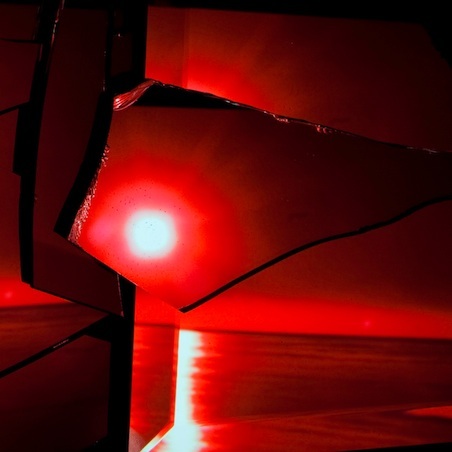
On paper, TV on the Radio’s recent accomplishments look like the work of textbook careerists. They left renowned indie label Touch and Go to join Interscope. Their major-label debut boasted a cameo from David Bowie. Singer Tunde Adebimpe starred opposite Anne Hathaway in a Jonathan Demme-directed drama. Guitarist/producer Dave Sitek made a record with Scarlett Johansson and is now possibly joining Jane’s Addiction. Of course, one listen to any TV on the Radio album quickly dispels any notion of calculated opportunism. Even as their art-rock soul has blossomed out of their home-recording roots into something bigger and bolder, their music is still fraught with a simmering unease; even the dancefloor-ready maneuvers of 2008’s Dear Science exuded a jittery, restless energy that was as tense as it was celebratory.
However, as Nine Types of Light suggests, perhaps they just needed to get out of Brooklyn. The new album marks two significant changes in TVOTR’s methodology: It was made in the wake of a one-year hiatus following six years of non-stop recording and touring; and it was recorded in Los Angeles, where Sitek has been steadily building his celebrity clientele list over the past few years. Both factors seem to have influenced the sound and feel of the album: Nine Types of Light is unquestionably TV on the Radio’s most patient, positive recording to date, taking its cues as much from Dear Science’s serene ballads (“Family Tree”, “Love Dog”) as its brassy workouts. Each of the band’s albums has opted for a tone-setting opening salvo, and mission statements don’t come more concise and clear-headed than Tunde Adebimpe’s ecstatic, falsettoed hook on Nine Types’ first song, “Second Song”: “Every lover on a mission/ Shift your known position/ Into the light.”
Love songs are, of course, nothing new for TV on the Radio, but they’re usually cast against the grim backdrop of life during wartime: Desperate Youth, Bloodthirsty Babes’ doo-wop serenade “Ambulance” spoke of emotional commitment using the language of hospital care; Return to Cookie Mountain’s “Province” effectively equated a declaration of love with an act of radicalism. On Nine Types of Light, however, there seems to be a more concerted effort on the band’s part to not let external pressures sully their inner spirit: Set to steady shuffle beats, “Will Do” and “You” are impassioned, open-hearted addresses delivered free of any political context, while Kyp Malone’s “Keep Your Heart” feels like a riposte to Cookie Mountain’s defeatist “I was a lover before this war” refrain, promising instead to “keep your heart, if the world all falls apart.” Malone’s stutter-funk standout “No Future Shock” takes this don’t-let-the-bastards-get-you-down sentiment to more delightfully absurd extremes, channeling pervasive anxieties over everything from global economic collapse to invasive airport security into a new dance move (“Do the no future! Do the no future!”).
Coming four songs in, “No Future Shock” at first feels like an anomaly on an album that frontloads its more elegiac material; the notion that Nine Types is a more subdued, comedown counterpoint to Dear Science is further posited by Adebimpe’s six-minute, mid-album centerpiece, “Killer Crane”, a pretty, proggy pastorale that gently ebbs and flows with flourishes of strings, piano, banjo, and mellotron. But the album’s second half is more in step with Dear Science’s manic swagger; though mid-tempo exercises “New Cannonball Blues” and “Forgotten” never catch fire to the same degree (even with the late-song intrusion of the horn section), “Repetition” is an exhilarating display of Adibempe and Malone’s motor-mouthed repartee set to a krautrock thrust. And as weird as it was to see Liars’ Angus Andrew faithfully singing INXS’ “Guns in the Sky” in a promo vid for Beck’s Record Club last year, Nine Types’ massive, arena-rattling closer, “Caffeinated Consciousness” proves that song must hold a special place in the hearts of Brooklyn’s post-punk class of 2002.
In the past, TV on the Radio have tried to undercut their more rockist ambitions with dissonant textures and queasy atmospherics, or lace their prettiest ballads with subversively ominous lyrics. But Nine Types of Light shows how TV on the Radio’s transmissions can be just as effective and affecting when delivered free of static and noise.
— Stuart Berman, April 12, 2011
